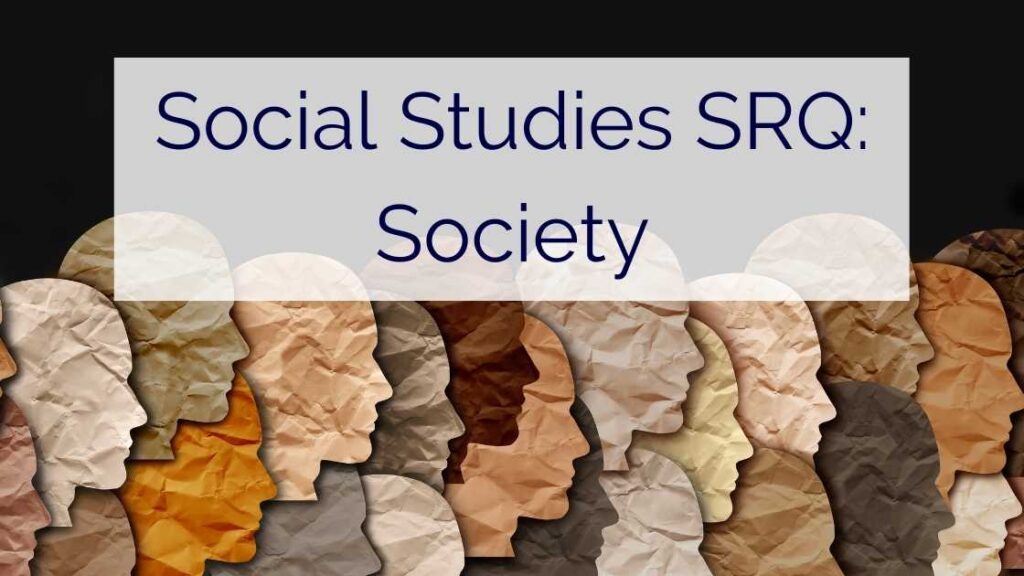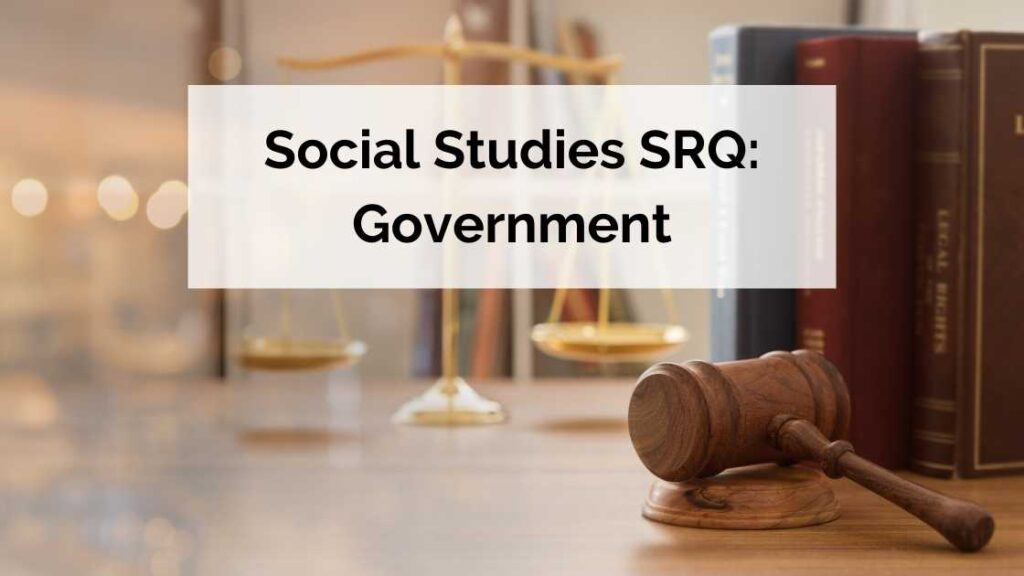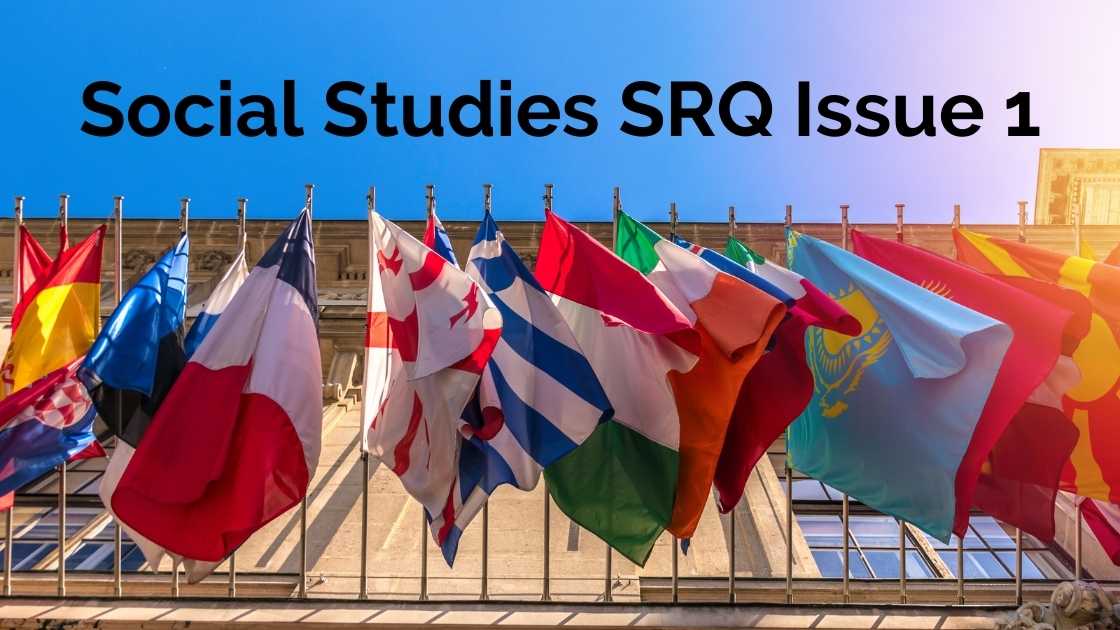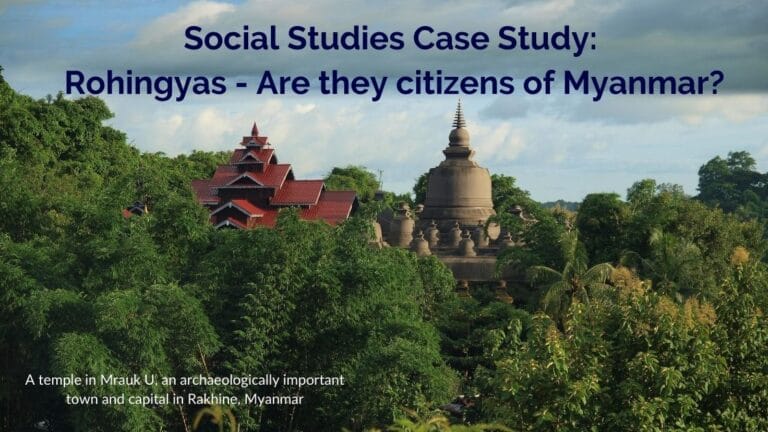Complete Sample Social Studies Issue 1 SRQ
This blog post focuses on sample essay questions for Social Studies Issue 1. For readers who just want to download the pdf version to read in their own time, I have put a link below this paragraph. You may also read these essays as a blog post.
Chapter 1.1: Different Attributes Shaping Citizenship
(1.1) Legal Status
(1.1.2) Rights of a citizen
(P) An attribute that shapes citizenship is that all citizens have the same rights.
(E) All countries have a constitution that guides the laws that all citizens must comply. It also sets down the rights of citizens. The constitution thus assures citizens that the state protects their well-being. It helps to ensure that the government respects all the rights of citizens and nobody is discriminated against because of their religion, ethnicity, social status or place of birth.
(E) For example, Singapore citizens have the right to practise their religion freely. The Singapore government ensures citizens are free to choose their religion, and ensures no religion is discriminated against. All Singapore citizens also have the right to education. This right protects the child and ensures all Singapore citizens have a minimum number of school years, thus helping them find jobs and function in society.
(L) Hence, an attribute of citizenship is that all its citizens have rights to protect them.
(1.1.3) Responsibilities of a citizen
(P) Another attribute of citizenship is that citizens have responsibilities.
(E) All citizens have responsibilities as they are all connected to other members of the community. If they do not fulfil their obligations, they can adversely impact the rights of another citizen. Also, by being responsible, citizens can contribute to the good of society and advance the country. As a result, it brings about progress and harmony in the country. The types of responsibilities depend on the country.
(E) In Singapore, men have the responsibility to participate in National Service. As Singapore is a small nation, it is difficult for Singapore to have a professional army. Thus, Singapore boys between 17-19 join National Service for two years. After that, they are put in a reserve force to be called up in emergencies. National Service helps to build Singapore’s defence and enables its political and economic stability.
(L) Thus, citizens have responsibilities to their nation.
(1.2) Identity and Participation
(P) Another attribute that shapes citizenship is identity and participation.
(E) Each nation is comprised of individuals who have a shared belief that they belong to the same country. These individuals may share a common way of life or share similar experiences and history. Thus, individuals share a bond and feel closer to others with the same identity. They also participate in the public affairs or general concerns of the society they live in. Therefore, they all contribute to the greater good of the state.
(E) For example, Singaporeans have shared experiences in school as they all sing the national anthem and say the pledge. Singaporeans also bond on food as they all have experienced eating food typical of Singapore, like chicken rice, roti prata and nasi lemak. Singaporeans thus share common culture and identity.
(L) Therefore, an attribute of citizenship is when people share a common identity and participate in public affairs.

Chapter 2.1: Challenges in Deciding What is Good for Society
(2.1.1) Differing Needs and Interests
(P) A diverse society may not be able to agree on what is important for the community.
(E) Most societies can agree on basic needs such as food, clothing and shelter. However, they might disagree on other aspects of what societies need, especially if it is diverse. Most importantly, as society has limited resources, it would be impossible to meet the needs and interests of everyone.
(E) For example, there were many disagreements when the Singapore government was deciding on whether to drill through the Central Catchment Reserve while building the Cross Island MRT line. Nature groups petitioned the government to construct the Cross Island line along the Reserve’s perimeter so as to protect the natural ecosystem of the reserve. However, many consumers and people living along the boundary wanted the rail to go through the reserve as it would make travel faster, and not impact on the properties along the perimeter of the nature reserve.
(L) Thus, it is not easy to decide what is good for society.
(2.1.2) Differing Priorities
(P) Even if society agrees on what is essential, they might not concur on what is more critical.
(E) As different people have different needs, they have different priorities. These priorities depend on their age, gender, income level and individual preferences. The priority of a successful middle-class man with a family will be very different from the priority of an old lady who lives alone, and has very little income.
(E) For example, a survey found that people who earn below $5,000 per month have different priorities than others who make above $5,000. This disparity is because the person who earns below $5,000 per month might find private housing unaffordable and is more concerned with public housing policies. On the other hand, the more affluent person might stay in private accommodation and is not affected much by public housing policies. He is, instead, more concerned with public healthcare. Both believe that public housing and public healthcare are essential to society but rank their priorities differently.
(L) Thus, different people with different priorities make it hard to decide what is good for society.
(2.1.3) Unequal Sharing of Costs
(P) Another challenge in deciding what is good for society is unequal sharing of costs.
(E) Whenever the government decides on a policy or provides benefits, not everyone gains equally. Sometimes, one part of society might have to lose out for the majority to benefit. This is because resources are finite, and the government has to weigh the tradeoffs of any policy it implements or help it provides.
(E) For example, when the Singapore government built the Thompson Line, some property owners along the proposed line had to sell their homes or shops to the government. Thus, they had to find new places to live or to do their business. In addition, those living above the proposed tunnels have to put up construction noise and pollution during construction. However, the rest of Singapore will enjoy the connectivity and convenience Thompson Line brings when it is completed.
(L) Hence, one challenge is that not everyone will benefit equally.
Chapter 2.3: Ideas Shaping Governance
(2.3.1) Having Good Leadership
(P) Having good leadership is important for the good of society.
(E) Good leadership will steer the country in the right direction of economic prosperity and growth. Good leaders need to make decisions for people’s benefit, not based on their self-interest. As such, they need to be honest, capable and have good moral character. Good leaders need to make correct decisions, even if they might not be popular. Making wise choices leads to an increased sense of confidence towards the country, ensuring people can work together and prosper as a nation. With political and social stability, it will be attractive to investors, resulting in more investment in the country and promoting economic growth that meets the needs of the people, such as employment.
(E) For instance, under the capable leadership of our first Prime Minister, Lee Kuan Yew and his team, Singapore grew into a developed country. Mr Lee was not afraid of making unpopular decisions, if he knew that it help Singapore further its goals. He also emphasised the need for the leaders of Singapore to be incorruptible and have good moral values. He emphasised the importance of selecting leaders and tested each person thoroughly before allowing them to hold position in the Singapore government.
(L) Therefore, having good leadership is important in working for the good of society.
(2.3.2) Anticipating Change and Staying Relevant
(P) Anticipating change and staying relevant is essential for the good of society.
(E) By anticipating change and staying relevant, the government prepares for future challenges and leverage potential opportunities; they can develop policies to maximise potential opportunities and minimise challenges before it is too late. This principle is essential as the globalised world changes rapidly and countries face a lot of competition. Being able to navigate the rapidly changing world will help the country develop and prosper.
(E) For example, the building of Integrated Resorts (IR) in Singapore created tension because the economic benefits and social costs were difficult to resolve. The building of the IR would help solve the problem of the underperforming tourist industry. Thus, Singapore would stay relevant, bringing in economic benefits like jobs and higher tourist spending. On the other hand, having the IR might bring about problems, like gambling addiction. The government anticipated this and placed an entry fee for Singapore citizens to enter the casinos. It also set up the National Council of Problem Gambling help educate the public on gambling. This has helped to minimise the problem of gambling.
(L) Therefore, anticipating change and staying relevant is vital in working for the good of society.
(2.3.3) Providing a Stake for Everyone
(P) Providing a stake for everyone is essential in working for the good of society.
(E) Providing a stake for everyone means that everyone feels a sense of belonging to the country. The government could provide a platform for people to voice their views. As a result, the government hears and values their opinions in certain decisions, allowing for discussions as people take ownership over the country’s future. The people would also own a part of the country, thus establishing ownership. As a result, people are more willing to contribute to the country’s progress and work with the government to decide how to develop the country.
(E) For example, the Public Housing Scheme and the Central Provident Fund strengthen the sense of belonging of citizens through homeownership, enabling all Singaporeans to own a home regardless of their financial status. Because Singaporeans own a home in Singapore, they would be rooted in the country and be more willing to work for the good of Singapore.
(L) Therefore, providing stake for everyone is essential in working for the good of society.
(2.3.4) Practicing Meritocracy
(P) Meritocracy is essential in working for the good of society.
(E) Singapore practices meritocracy. It is a system that distributes opportunities to enable future successes. This system rewards people according to their effort rather than race, religion, or socio-economic background. By practising meritocracy, citizens are motivated to work hard. As a result, talents are recognised and duly rewarded. Thus, people will be more motivated to contribute to society, and Singapore can achieve economic and social progress.
(E) For example, the Ministry of Education awards students who perform well in their studies and CCA to help them excel further in their education. The Edusave Scholarship and Merit Bursary schemes reward the top 10% and 25% of school students, respectively. This encourages Singaporean students to work hard as they know that they would gain the rewards for performing well. This system is practised widely throughout Singapore society, and encourages people to work to their best, and contribute to society.
(L) Therefore, practising meritocracy is essential in working for the good of society.

Chapter 3.1.1: Roles of Government: Working for the good of society
(3.1.1.1) Maintaining Internal Order and External Security
(P) Maintaining internal order is an essential role of government in working for the good of society.
(E) By maintaining internal order, the government ensures peace and safety in the country. With stability and order in the country, social services such as schools and hospitals can help the country’s citizens. Hence the needs of citizens are met, achieving social stability in the country. Singapore will also be able to attract investors to grow our economy given such a conducive environment. Thus, the country prospers and attains economic progress.
(E) Government agencies like the Singapore Police Force (SPF) and the Singapore Civil Defence Force (SDF) help to protect and safeguard people and property. Other organisations, such as the Internal Security Department (ISD), also keep Singapore safe and sovereign. For example, ISD collects accurate intelligence, makes impartial assessments and takes timely action to counter security threats to Singapore’s internal stability and sovereignty.
(L) Hence, maintaining internal order and external security is an important role of government in working for the good of society.
(P) Maintaining external security is an essential role of government in working for the good of society.
(E) By ensuring external security, Singapore can help assure its citizens and potential investors that they are protected from external threats. Thus, investors will invest in Singapore, which can help achieve more sustained economic growth and better meet the needs of its citizens.
(E) As for external security, agencies such as The Army, The Navy and The Airforce strengthen Singapore’s defence and deter potential enemies from attacking Singapore. At the same time, the Ministry of Foreign Affairs contributes to the formulation and implementation of Singapore’s foreign policy to advance our national interests through the forging of strong partnerships at bilateral and multilateral levels. Thus, Singapore is seen as a responsible and constructive member of the international community, thus ensuring our security.
(L) With this two-prong approach, Singapore can ensure its sovereignty and security and help society’s good.
(3.1.1.2) Ensuring Justice
(P) Ensuring justice is an important role of government in working for the good of society.
(E) The Judiciary ensures justice in Singapore. The Judiciary’s responsibility is to interpret and apply the laws passed by the Legislature independently. With the presence of the Judiciary, Singaporeans will have confidence that the courts will judge people fairly. As a result, citizens have confidence that they’re well being taken care of and a fair justice system is in place. As a result, citizens live in a stable, safe and low-crime environment. As such, citizens will be more willing to contribute positively to the nation, thereby contributing to the country’s social, political and economic progress.
(E) One example of the Judiciary interpreting and applying the law passed by the Legislature is providing relevant information and acting to protect Singaporeans from family violence. For example, the Family Justice Courts provide guidelines on family violence, apply for a Personal Protection Order (PPO), use, and take the courts’ actions, protecting Singaporeans from abuse by a family member.
(L) Hence, ensuring justice is an important role of government in working for the good of society.
(3.1.1.3) Providing Goods and Services
(P) Providing goods and services for the public is an essential role of government in working for the good of society.
(E) By providing goods and services for the public, the government ensures that all citizens can access these goods and services. If left to the market, citizens who cannot afford to pay may not have access to these goods and services. Furthermore, as citizens are being taken care of, citizens are more willing to contribute to the country. In addition, some of these goods and services are also the critical infrastructure that attracts investors to our country. Therefore, by providing goods and services for the public, it can also help develop our economy.
(E) The government devotes significant resources to improving the well-being of its citizens. In their daily lives, citizens enjoy benefits from the provision of goods and services for the public. These goods and services are provided for or subsidised by the government to have access to them. An example of a service provided for the people is transportation. In Singapore, the government has developed a people-centred public transport system with more connections and better services.
(L) Hence, providing goods and services for the public is an essential role of government in working for the good of society.
(3.1.1.4) Safeguarding the Interests of Citizens
(P) Safeguarding the interests of citizens is a vital role of government in working for the good of society.
(E) By safeguarding the interest of citizens, they will have a sense of security and belonging to the country. The feeling of security will ensure social and political stability where citizens feel that they are being watched and cared for by the government. Citizens will be more motivated to work alongside the government to achieve progress for the country, economic or social.
(E) Governments implement legislation that safeguards the interest of citizens. These laws ensure citizens have a sense of security about living in the country. For example, the government introduced the WorkRight Initiative to help employees and employers understand their rights and responsibilities. The WorkRight Initiative intends to create awareness of employment rights amongst low-wage workers. The initiative helps employers understand and support the rights of the workers and help employees understand their rights so that they would not be taken advantage of. This builds better employer-employee relationships and enables them to work together for the betterment of society.
(L) Hence, safeguarding the interest of citizens is an important role of government in working for the good of society.
Chapter 3.2.1: Role of Citizens: Outcomes of citizen participation
(3.2.1.1) Contributing to the needs of society
Formal Groups (NGOs)
(P) Social Service Agencies (SSAs) have an essential role to play in working for the good of society.
(E) SSA are non-profit organisations that provide welfare or services that benefit the community. They have clear objectives and are formally registered with the government. They address a wide range of interests, such as persons with special needs or protecting the environment. SSAs can help complement the government’s role in providing support, resources, and services in areas lacking in society. The government has a limited budget and cannot meet the needs of everyone in the community. SSAs are essential to fill in the gaps. Furthermore, as they can also provide expertise to cater to the diverse needs of society more effectively.
(E) An example of a SSA is the Intellectually Disabled of Singapore (MINDS) movement, which aims to advance the development, well-being, and aspirations of persons with intellectual disability and their integration into society. Hence, SSAs play an important role in helping to look out for groups of people who may not have enough access to resources and assist them in those areas, and at the same time provides additional resources to work for the betterment of society.
(L) Therefore, formal groups or SSAs have an essential role in working for the good of society.
Informal Groups
(P) Informal groups play an essential role in contributing to the needs of society.
(E) Informal groups are organisations with a specific, short term objective related to unforeseen circumstances. Many of them are temporarily in nature and may not be registered with the goverment. They complement the support structures provided by the government. As such, informal groups can help fill in the gaps and increase the overall well-being of the citizens in times of sudden events, which can better contribute to the needs of society.
(E) For example, during the Covid-19 pandemic, hawkers banded together to help each other during the Circuit Breaker. They launched a Facebook page called, “Hawkers United”. The more technological savvy hawkers helped to promote hawker stalls and consolidate delivery services. All these efforts helped to keep many hawker stalls operating as patrons could not visit these stalls during this period.
(L) Therefore, informal groups have an essential role to play in contributing to the needs of society.
Individuals
(P) Individuals have an essential role to play in working for the good of society.
(E) Individuals play an essential role in contributing to the needs of society through volunteering their time, effort and money towards meaningful social causes. Individuals who contributed to community needs usually do so as they feel that their efforts would be helpful. Through their conviction and passion, they can also inspire others to make similar improvements. Moreover, as individuals are closer to their community, they may be able to identify the needs of society. Given the government’s limited budget and the diverse needs of the citizens, individuals can also complement and work on specific needs of the community that the government cannot meet.
(E) For example, Mr Tan started the Singapore Glove Project. Its objective is to explore different parts of Singapore by walking, jogging or running. Along the way, they would pick up the litter they encounter. Thus, their motto is “Pick up litter, make new friends, and absorb the beauty of Singapore.”
(L) Therefore, individuals have an essential role to play in contributing to the needs of society.
(3.2.1.2) Influencing government decisions
Individuals
(P) Individuals play an essential role in influencing decisions for Singapore.
(E) Individuals should be able to influence government decisions. Doing so allows them to have a conversation with the government. Thus, the government can better understand what is going on in the community as individuals are closer to their community. Therefore, they can identify the community’s specific needs that the government cannot understand and give suggestions to help the government make better decisions.
(E) For example, many individuals spoke up when it was revealed that the data in the TraceTogether app could be used in a criminal investigation when the government had promised it was only used for fighting Covid. Due to the feedback, the government decided to legislate a law to restrict TraceTogether data.
(L) Thus, individuals can influence the Singapore government decisions for the better.
Organised Groups
(P) SSAs have been powerful advocates for changes in government decisions.
(E) SSAs are legal groups that are non-governmental organisations. These organisations have clear objectives and are formally registered with the government. They address a wide range of interests, such as persons with special needs or protecting the environment. As a result, SSAs can help influence the government’s decisions for the better. As the government cannot oversee everything in Singapore, SSA are essential to fill in the gaps.
(E) For example, the Humanitarian Organisation for Migration Economics (HOME) and the Transient Workers Count Too (TWC2) recommended that foreign domestic helpers be given a day off a week in 2011. The recommendation was because a small minority of employers abuse their helpers by refusing to provide them with any rest. In 2013, the Singapore government passed a law to give them a weekly rest or compensation in lieu.
(L) Thus, SSAs can help to influence government decisions.
(3.2.1.3) Strengthening citizens’ sense of belonging
(P) One outcome of engaging with the government is that citizens can develop a stronger sense of attachment towards Singapore.
(E) The government has made an effort to engage with Singapore citizens and organised groups to build a better Singapore. They believe that engaged citizens will be beneficial for the good of Singapore. As Singapore citizens feel that they can impact government policies, they will have a stake in the future of Singapore. This effort has become easy due to social media such as Facebook and Instagram, where individuals can directly reach out to government ministers.
(E) For example, in 2007, the government consulted a range of interest groups when it wanted to create a space for youths. Many youths participated in the process and submitted videos, impressions and models to the government regarding their ideas on what sort of space would be best. As a result, *SCAPE was built as a result of their feedback. As a result, youths can identify with the part they played in effecting change to the landscape in Orchard Road.
(L) Hence, an outcome of citizenship participation is to strengthen the sense of belonging of the citizens.
Conclusion
This concludes all the sample essay questions for Social Studies Issue 1. These essays are meant to be a guide and not for memorization. You can find more information regarding Social Studies or Social Studies SRQ.
Other parts of the SRQ samples are here:
Finally, the downloadable pdf can be found below.

Critical Thought English & Humanities is your best resource for English, English Literature, Social Studies, Geography and History.
My experience, proven methodology and unique blend of technology will help your child ace their exams.
If you have any questions, please contact us!







